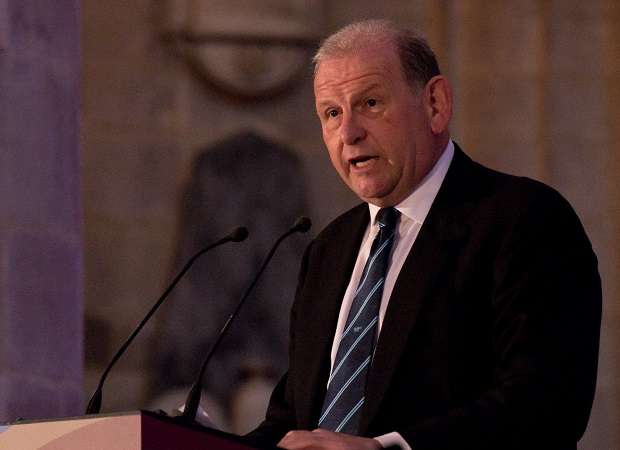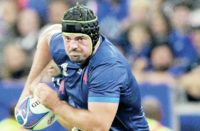 Rob Andrew's departure from the RFU as their professional rugby director may have been presented as a long-planned exit, but his so-called “resignation” has been taken with a large dollop of salt by those of us used to the PR machinations of England's Rugby Union.
Rob Andrew's departure from the RFU as their professional rugby director may have been presented as a long-planned exit, but his so-called “resignation” has been taken with a large dollop of salt by those of us used to the PR machinations of England's Rugby Union.
It is stretching credibility to breaking point to suggest that Andrew, whose departure from Twickenham was announced on Friday evening following discussions with RFU chief executive Ian Ritchie, is stepping away from his £400,000 annual salary voluntarily.
Andrew earned the nickname ‘Teflon' because none of the damaging fall-out from England's multiple failings at national level over his decade as the RFU's operations director (twice), and professional rugby director, ever seemed to stick to him. This was some feat given that four England head coaches/man- agers – Andy Robinson, Brian Ashton, Martin Johnson and Stuart Lancaster – were shown the door during that period.
Given the tenacity with which he guarded his position over that time there is little doubt that Andrew was pushed, and that his long overdue exit is the result of the most extensive reorganisation of the RFU for more than a decade.
Andrew became embedded in the RFU after 2006, and the former Newcastle Falcons rugby director was widely praised for having played a key role in brokering the club-country financial compensation and player release agreements signed between the Premiership and the RFU in 2007. However, the messy dismissals of Robinson and Ashton called his judgement into question, and his stewardship of the equally messy tour to New Zealand in 2008 pending Johnson's arrival did not help.
Set against that, the Premiership club academy system he helped formulate started to produce results, with the England U20s reaching World Junior Championship finals in 2010 and 2011, before winning the tournament in 2013 and 2014.
However, the improvement and channelling of players from those teams into the full England structure often seemed haphazard. The same was true of the England coaching structure, with no clear succession plans put in place. Andrew's overall failure to see the potential of the Sevens circuit as a development tool was also a serious oversight – and the lack of a clear strategy for team GB for the inaugural Olympic Sevens in Rio has highlighted it.
His immediate replacement by Nigel Melville, the former England scrum-half who has been chief executive of USA Rugby since 2007, is a breath of fresh air.
Although Eddie Jones will continue to report directly to Ritchie, Melville's role as director of professional rugby will be much more clearly demarcated than it was with Andrew. It embraces not only the responsibility for high-performance, but also that of international player development in place of Joe Lydon, another recent RFU resignation.
The likelihood is that Andrew's fall from grace at Twickenham has happened in the six months since the 2015 World Cup. This is not entirely surprising given that Andrew had been highly influential in advising Ritchie – who admitted he was a rugby novice when he arrived from Wimbledon – to appoint Lancaster as the England head coach in the wake of the PR fiasco at the 2011 World Cup.
That he was in a position to influence Lancaster's appointment after failing to accept any responsibility for the mis-handling of the off-field shenanigans in New Zealand was greeted with incredulity by Press and public alike. The impression of Andrew as an arch politician hardened when he allowed Johnson to shoulder the entire responsibility, leading, predictably, to his resignation as England manager.
Andrew survived the next four years but his hand in promoting the inexperienced, untested Lancaster, and the subsequent unprecedented pool exit of the host nation in the 2015 World Cup, saw him lose the support of Ritchie and the RFU's board of directors.
The word circulating in the corridors at Twickenham is that the board of directors has been given a steely sense of purpose by the arrival of Andrew Cosslett, a former chief executive of InterContinental hotels and Fitness First with an impressive track record.
Cosslett's stock has rocketed since his appointment as chairman of England Rugby 2015, the RFU operation set up to deliver the last World Cup. With the tournament a roaring success, with sold-out stadiums and record profits estimated at £50m for the RFU, as well as the kudos of hosting a hugely successful tournament, Cosslett is being touted to take over from Bill Beaumont as RFU chairman.
Six weeks before the World Cup, Cosslett insisted that his mission was to make it the best tournament there has been. He not only delivered on that count, he also showed a clear understanding of the big picture, insisting that a worst-case scenario of an early
England exit would not derail the tournament.
“We're not thinking about who gets through, our job is to put on a tournament that can deal with any outcome while delivering a fantastic tournament and celebration of rugby,” Cosslett said.
My hunch is that Cosslett has also been looking at the big picture of an RFU high-performance department which failed to deliver a top-quality Championship-winning side for a decade. And that decade corresponded to Rob Andrew's tenure.


























